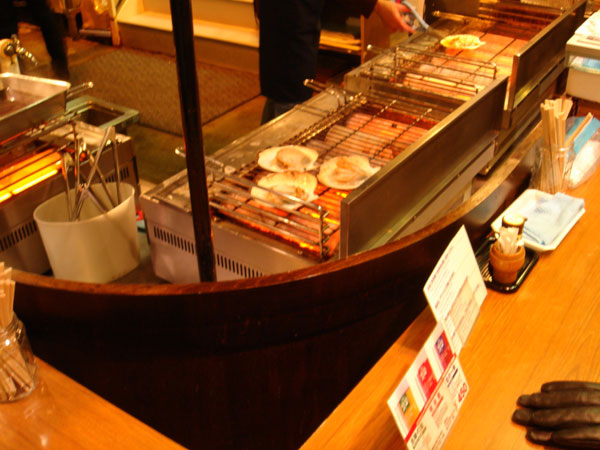An article of dogs ownership published by Star last month where I was one of the person interviewed.
One of the family
By ELIZABETH TAI
The Star, 24 Jan 2006
Patches, a two-year-old Shih Tzu, is one lucky pooch. Not only does he have a well-made bed area (complete with fluffy pillows) and a basket full of toys, he has his very own chef too.
“My pastor thinks I’m mad,†said Ten Siew Yung who once held a birthday party for Patches at her pastor’s house with friends and relatives. Actually, her friends and relatives think so too, but Ten is used to it by now. She just laughs it off and says that she’ll do anything for “Patchy Boyâ€.
That includes preparing well-balanced home-cooked meals made out of the finest organic ingredients for Patches.
Every morning before going off to work – Ten is a private tutor – Ten throws some quinoa grains into the rice cooker, lightly steams meat and vegetables and then adds some healthy supplements, which she makes herself, to the meal.
Ten Siew Yung and her dog, Patches. Ten prepares Patches’ meals carefully, ensuring that they’re organic and nutritious.
Patches eats only organic chicken – after it’s been put through the ozonizer to remove toxins. Sometimes Ten gives him some fish oil, home-made yoghurt, or liver treats which she makes herself.
Ten created Patches’ menu after much research from books bought from the Internet. She cautions against feeding dogs food scraps as it is not well-balanced and contains ingredients that are harmful to dogs.
Her obsession with Patches’ nutrition came after he had an operation which shortened his intestines.
“A lot of dogs die young of diseases, and I wonder if it’s to do with the food that they’re given,†said Ten. She wanted to prevent that from happening to Patches and threw herself into research.
After breakfast, Patches will be taken to his dogsitters’ place (she pays her a monthly fee) so that he will not be alone while she is away at work.
“I know that they can be left alone but my heart is just not at peace when he’s alone,†she said and then laughed, sounding almost embarrassed.
Ten didn’t think that she’d become the kind of dog owner she is today.
“I lost a dog when I was young and I was very affected by the incident. He was poisoned and he died on the vet’s table,†said Ten. After the incident, Ten vowed not to have dogs, so when a good friend gave her a Shih Tzu puppy, she was reluctant to keep him.
She promised her friend that she’ll “try it out†for a week.
“For some reason, we developed a strange bond. He seems to understand what I say,†she said. The trial period is long over, and now the two are inseparable.
Fruit of urbanisation Pets as surrogate children? It’s nothing unusual, said Deputy Chairman of the Malaysian
National Animal Welfare Foundation Dr S. Sivagurunathan.
Before, pets are kept because of their usefulness – as guard dogs or mousers – but now many are regarded as members of the family, appearing in family photos and boasted about by proud human parents to their friends.
Urbanization coupled with affluence and education has played a large part in this shift.
More people are now living in the cities, and as city folks, their lives are busy. Parents choose to have pets keep their children company while they’re away at work. Singles, some living alone, seek companionship from the unconditional love of animals. Families are becoming smaller, so pets fit in well. And as Malaysians become wealthier, they spend more on their pets.
“This happens throughout the world. All big, metropolitan cities are going through these changes. It’s not a Western or Asian culture thing,†said the veterinarian.
And as pets become family members, owners treat them as such, extending their life, giving them better food and preventive health care.
“Veterinary practice has changed tremendously for the past 30 years,†said Dr Sivagurunathan. For one, old age animal management is a big part of the veterinarian’s work.
“For the past 10 years, more modern veterinarian clinics are coming in and sophisticated equipment are now being used for diagnostic purposes,†he said. All this, again, is not unusual.
“The vet practices have to improve to meet the needs of the public,†he said.
The same for pet services. Pet shops are springing up, and the last few years saw the birth of department-store-like pet shops such Pet Safari at Ikano Power Centre in Petaling Jaya and Pets Wonderland which has several branches in PJ and Kuala Lumpur.
There are also more “exotic†pet services: A look at the notice board outside Pet Safari and one can see various services being offered, from the usual grooming services to hand-drawn pet portraits and homemade organic cookies for pets.
However, Malaysia has certainly not reached a stage where pet spas and pet cafes are the norm. For one, many dogs are still barred from parks, which is something that frustrates dog lover Khoo Boo Gee.
Khoo, who created popular pet websites koi.com.my (he is also an avid koi enthusiast), puppy.com.my and kitten.com.my, didn’t let that stop him, however. Since 2000, the businessman has organised gatherings at Central Park, Bandar Utama, Petaling Jaya, which are attended by thousands of dog lovers and their dogs. Also, he created “K9 Trekkers†(www.puppy.com.my/k9trekkers) – every Saturday morning, dogs and their owners will go jungle trekking at Gasing Hill, Petaling Jaya.
When asked if dog parks – a park where dogs can frolic freely – could become a reality in Malaysia, Khoo answered frankly: “Not easy. Unless someone is willing to do it on a charity basis, whereby it’s not a commercial concern. Because if it is, the park will not make money.
“If the park were to come from the Government it may be quite tough, because the Government has to consider the public, and we are a multiracial society.â€
However, Khoo believes that if dog owners were to become more responsible, things will improve.
“It’s very important that when you own a dog you should cause minimum inconvenience to people,†he said.
“For example, if I live in a housing estate and let my dog roam without control, it may intimidate people. If this keeps happening, people will complain to the council and they may tighten the rule on dog ownership.
“However, if people keep their dogs on a leash, and ensure that they don’t cause inconvenience to other people, in the long run, people will accept the presence of dogs. If everyone move in this direction, things will improve.â€
Not a perfect picture Dogs like Patches may live a princely life, but there are many animals that are not as lucky. Kept by irresponsible owners, their lives are one of misery.
When Sheena, a German Shephard, was found starving and sitting by a bowl of contaminated water in August last year, the public was outraged. But when her owner was fined a measly RM100 in October, they were aghast.
This only strengthened the resolve of animal lovers and organizations like Society for the Prevention of Cruelty to Animals to have the Animal Ordinance 1953 amended.
(Section 44(1)(d) of the Ordinance penalizes those convicted of animal cruelty with a maximum RM200 fine, or a maximum six months’ jail term, or both.)
“That legislation should’ve been changed a long time ago,†said Dr Sivagurunathan.
In the past, when farm animals were abused, they were charged RM120, he said.
“Today, the same legislation is used for companion animals which is wrong, where cruelty is viewed with much more severity. It has to be changed, it has to be done, and I think it will be done,†he said.
Dr Sivagurunathan, however, is optimistic that change is coming. The fact that the media chooses to highlight animal abuse cases and the hue and cry from the public when such cases are highlighted shows that animal welfare is growing fast among communities, and that’s a good sign, he said.
“People are becoming very sensitive to life,†he said. “We’re going to be a developed nation by 2020, so obviously our mindset must change. It’s no use having big cities without developing the mind,†he said. “And if animal welfare is becoming a part of our concern, we’re moving towards a developed status,†he said, quoting Gandhi: “The greatness of a nation can be judged by the way its animals are treated.â€




